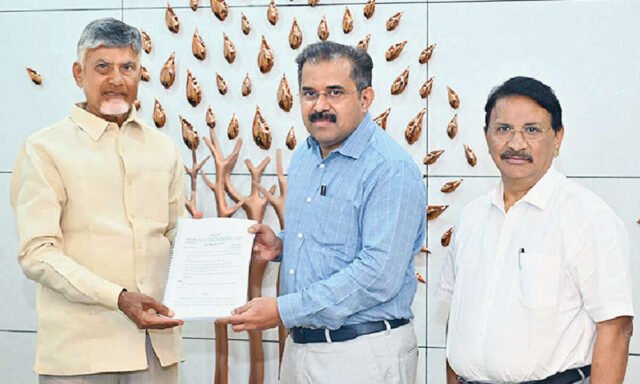Vijayawada: The new GST 2.0 reforms will come into effect from midnight, marking a historic milestone for the commercial taxes department, which, for the first time, issued government orders (GOs) in Telugu. Chief Minister N Chandrababu Naidu on Sunday released a booklet containing all 11 GOs in both Telugu and English at his Undavalli camp office and reviewed the new tax policy with senior officials.
Officials said the decision to publish orders in Telugu aims to bring governance closer to the people and make tax-related matters easily understandable. “Reading in one’s mother tongue creates a deeper connection. This step will greatly help common citizens, traders, accountants, and professionals across both Telugu states,” said Commercial Taxes Chief Commissioner Babu A in a statement.
The GST 2.0 reforms are projected to provide Rs 2 lakh crore benefits nationally, with Andhra Pradesh alone set to gain around Rs 8,000 crore.
GST on several daily-use items such as butter, ghee, paneer, soaps, shampoos, hair oils, processed foods, biscuits, and coffee has been cut from 18 percent to 5 percent. Packaged milk, bread, and paneer are now fully exempt.
Taxes on two-wheelers, small cars, TVs, ACs, and cement reduced from 28 percent to 18 percent. Sweets, chocolates, and ice creams will now attract only 5 percent GST.
Farmers will benefit from reduced GST on fertilisers, pesticides, and tractors (12 percent to 5 percent). To boost handicrafts and traditional industries, items like Etikoppaka toys, Kondapalli toys, and handloom textiles will now carry only 5 percent GST, encouraging exports and rural livelihoods.
Hotel tariffs will come down with lower GST rates, giving a push to the tourism sector. Lower prices will enhance purchasing power, strengthening the MSME sector and creating jobs. Life-saving medicines and health insurance premiums have been exempted from GST, with estimated consumer savings of up to Rs 1 lakh crore.
Chief commissioner Babu A emphasised that GST 2.0 is more than a tax reform—it is a citizen-first policy aimed at reducing costs, simplifying compliance, empowering households, farmers, and students, while strengthening the economy.
The reforms also align with Andhra Pradesh’s 10 guiding principles, including poverty eradication, water security, farmer welfare, skill development, global logistics, clean energy use, promotion of handicrafts, Swachh Andhra, and deep-tech adoption.
With these next-gen reforms, GST 2.0 is expected to provide a major boost to India’s economy while ensuring direct benefits for every household.






